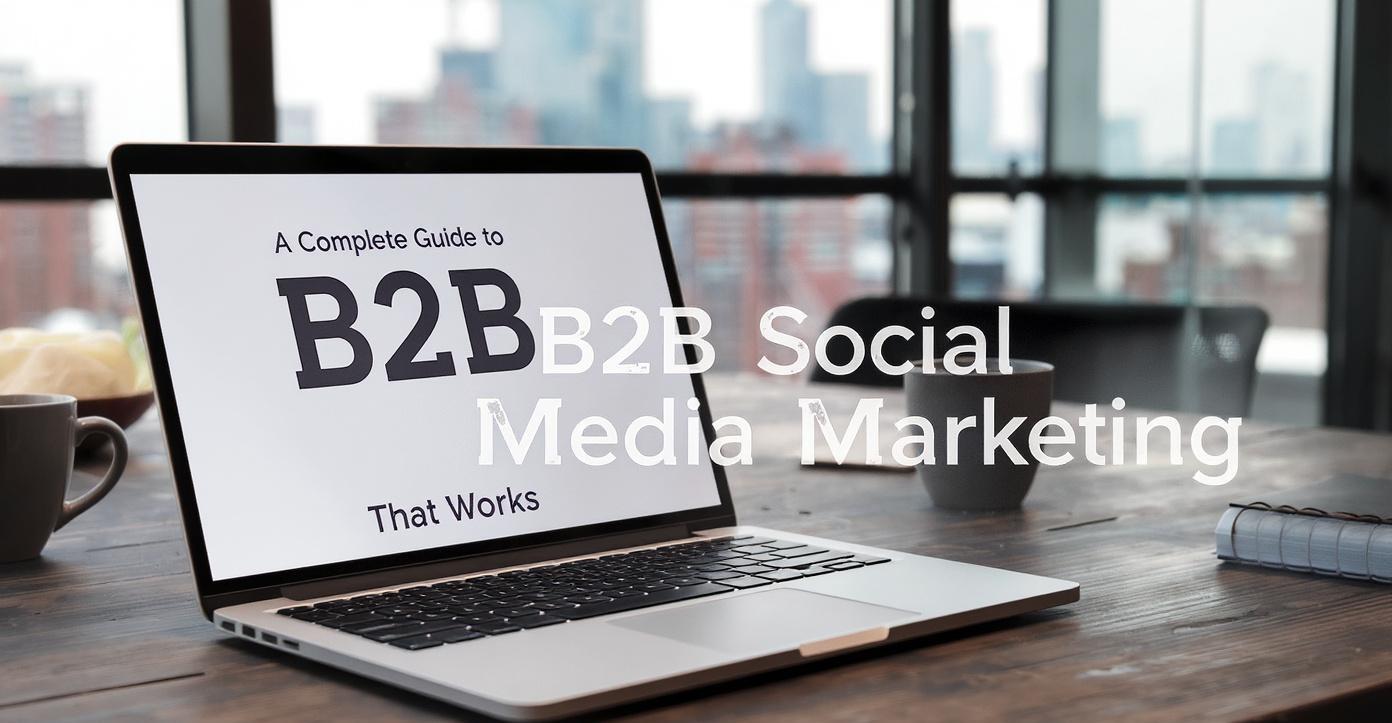Step-by-Step Guide to Successful B2B Social Media Marketing

In 2025, B2B Social Media Marketing has become a critical strategy for companies seeking to drive engagement, generate leads, and strengthen their brand presence. Leveraging advanced social media strategies allows businesses to connect with key decision-makers, share valuable insights, and build lasting professional relationships. Effective B2B social media integrates strategy, content creation, and analytics to achieve measurable business outcomes and maintain a competitive advantage.
Understanding B2B Social Media Marketing
B2B Social Media Marketing focuses on engaging professional audiences, industry peers, and decision-makers rather than individual consumers. Success requires delivering value, addressing business challenges, and establishing credibility. Platforms such as LinkedIn, Twitter, YouTube, and niche professional forums are ideal for thought leadership, content sharing, and lead generation. Unlike B2C marketing, B2B emphasizes relationship-building, expertise, and trust.
Defining Your Target Audience
A clear understanding of your audience is the foundation of effective B2B social media campaigns. Detailed buyer personas including job roles, industry sectors, company sizes, and challenges help create content that resonates. Monitoring competitor strategies, analyzing engagement patterns, and tracking audience behavior ensures content reaches the right people. Choosing the right platforms maximizes engagement and lead conversion potential.
Developing a Comprehensive Content Plan
Content is the backbone of successful B2B social media marketing. Blogs, whitepapers, eBooks, case studies, webinars, videos, and infographics provide value to professional audiences. High-quality content should address industry pain points, provide actionable solutions, and position the brand as a trusted authority. Mapping content to the buyer journey ensures prospects receive relevant messaging at every stage. Using a content calendar helps maintain consistency and track campaign performance.
Leveraging LinkedIn for B2B Growth
LinkedIn is the most powerful B2B social media platform due to its professional audience and targeting options. Companies can share thought leadership articles, post updates, participate in groups, and run sponsored campaigns. LinkedIn Ads and InMail campaigns allow targeted communication with decision-makers. Engaging in discussions and sharing relevant content builds credibility and fosters long-term professional relationships.
Engaging Audiences on Twitter
Twitter is an excellent platform for real-time engagement with industry audiences. By sharing updates, participating in trending conversations, and using hashtags strategically, businesses can increase visibility and engagement. Twitter polls, Q&A sessions, and chats provide direct interaction with prospects, while consistent activity helps maintain authority and relevance in the industry.
Using Video and Visual Content
Video and visual content are critical for B2B engagement. Platforms like YouTube, LinkedIn, and Instagram support webinars, product demos, tutorials, and client testimonials. Videos are highly engaging, shareable, and effective at explaining complex solutions. Short-form videos raise awareness, while long-form content nurtures leads and builds authority. Visuals such as infographics and charts further enhance understanding and engagement.
Balancing Organic and Paid Strategies
A combination of organic and paid strategies ensures maximum impact. Organic content builds credibility and fosters relationships, while paid campaigns accelerate reach and lead generation. LinkedIn Ads, Twitter Ads, and Facebook Ads allow precise targeting by role, industry, and company size. Retargeting campaigns re-engage users who have interacted with content, improving conversion rates and ROI.
Building Community and Encouraging Engagement
B2B social media marketing is about relationships. Responding to comments, participating in discussions, and encouraging employees to share content strengthens trust. LinkedIn Groups, Twitter chats, and professional forums provide avenues for direct engagement with prospects and industry peers. Building a community increases loyalty, encourages advocacy, and improves lead quality.
Measuring Performance and Optimizing Campaigns
Analytics are essential to track the effectiveness of B2B campaigns. Key metrics include engagement rate, click-through rate, lead conversions, and audience growth. Tools like LinkedIn Analytics, Google Analytics, Hootsuite, and Sprout Social help monitor performance. Insights from analytics allow marketers to optimize content, improve targeting, and maximize ROI.
Collaborating with Influencers and Thought Leaders
Partnering with influencers and thought leaders enhances credibility and extends reach. Guest posts, webinars, interviews, and co-hosted campaigns expose content to new audiences and establish authority. Thought leadership initiatives build trust with decision-makers and help differentiate the brand from competitors.
Optimizing for Lead Generation
Lead generation is a primary goal of B2B social media marketing. Offering gated content such as eBooks, research reports, and webinars encourages prospects to share their contact information. Strong calls-to-action, optimized landing pages, and lead nurturing workflows guide prospects efficiently through the buyer journey. Retargeting engaged users further increases conversion potential.
Automating Social Media Efforts
Automation platforms streamline posting, engagement tracking, and reporting. Tools like HubSpot, Buffer, and Hootsuite allow consistent scheduling, monitor engagement, and provide analytics. Automation frees up time for strategy development, content creation, and personalized engagement, enhancing overall efficiency and results.
Keeping Up with Trends and Platform Changes
Social media evolves constantly. Live streaming, AI personalization, interactive content, and short-form videos are becoming increasingly important. Adapting strategies to trends and platform updates ensures campaigns remain relevant, engaging, and competitive. Testing new formats and analyzing performance helps improve results continuously.
Integrating Social Media with Broader Marketing Strategies
B2B social media marketing works best when integrated with other marketing efforts. Combining campaigns with email marketing, SEO, content marketing, and events ensures cohesive messaging and stronger lead nurturing. Marketing automation tools help coordinate campaigns, track performance, and optimize results across channels.
Continuous Testing and Improvement
Regular testing and optimization are vital for campaign effectiveness. Conducting audits, analyzing competitors, experimenting with content types and formats, and gathering audience feedback ensures strategies remain effective. Continuous improvement enhances engagement, attracts high-quality leads, and maximizes ROI.
Read Full Article : https://acceligize.com/featured-blogs/a-complete-guide-to-b2b-social-media-marketing-that-works/
About Us : Acceligize is a global B2B demand generation and technology marketing company helping brands connect with qualified audiences through data-driven strategies. Founded in 2016, it delivers end-to-end lead generation, content syndication, and account-based marketing solutions powered by technology, creativity, and compliance.
- Art
- Causes
- Crafts
- Dance
- Drinks
- Film
- Fitness
- Food
- Παιχνίδια
- Gardening
- Health
- Κεντρική Σελίδα
- Literature
- Music
- Networking
- άλλο
- Party
- Religion
- Shopping
- Sports
- Theater
- Wellness



